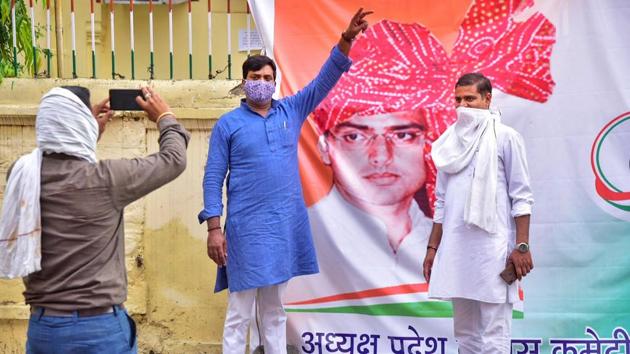As Sachin Pilot’s camp argues anti-defection law, case draws focus on Speaker’s role
As ousted Rajasthan deputy chief minister, Sachin Pilot, and 18 legislators loyal to him took their battle to court, their first move was to challenge the notice slapped by assembly Speaker CP Joshi on their disqualification from the House.
The assembly Speaker’s role in an anti-defection case has once again come under the judicial scanner -- this time, in Rajasthan.

As ousted Rajasthan deputy chief minister, Sachin Pilot, and 18 legislators loyal to him took their battle to court, their first move was to challenge the notice slapped by assembly Speaker CP Joshi on their disqualification from the House.
The Speaker faces judicial scrutiny as under 10th Schedule of the Constitution (the anti-defection bill) he is the sole authority on such issues. Chapter 6 of the 10th schedule says, “If any question arises as to whether a member of a House has become subject to disqualification under this Schedule, the question shall be referred for the decision of the Chairman or, as the case may be, the Speaker of such House and his decision shall be final.”
Also read: High Court gives rebel Congress MLAs 4-day breather
Abhishek Singhvi, the Congress’ old warhorse in anti-defection cases faced senior counsel Harish Salve and Mukul Rohtagi, representing Pilot and the others. The Pilot camp’s core argument revolved around whether the anti-defection law can be applied on incidents outside the assembly while Singhvi argued that the Speaker’s consideration of “allegations of speech and activities outside the House” is not mala fide and is within the contours of the Constitution. He claimed that assembly speakers across state legislatures have done so in a manner consistent with the 10th Schedule and in cases “identical” to the current one.
Legal experts are divided on this. Some like Singhvi believe it can. But others believe that rebellion can only be established if an MLA disobeys whip or directions in the House.
There is also a debate over one sentence of the 10th Schedule. In the Chapter 2 of the Schedule—disqualification on ground of defection.— part 1 (a) says that a member of a House belonging to any political party shall be disqualified for being a member of the House “if he has voluntarily given up his membership of such political party”.
The Congress’ legal advisor say that not attending legislative party meeting (Pilot ignored party whips and skipped two CLP meetings earlier this week) amounts to voluntarily giving up the membership. But many experts disagree.
Over the past few years too, several high-profile anti-defection cases have hogged the legal limelight. In 2016 Uttarakhand saw nine Congress MLAs shifting sides and BJP legislative party claiming majority in the assembly. Governor KK Paul asked the Congress to prove majority within a small window. As the Congress protested, President’s rule was imposed. The Congress went to court against President’s rule.
Also read| Sachin Pilot’s petition is not maintainable says Rajasthan speaker: All details here
In 2019, the BS Yediyurappa case saw the defection of Congress and Janata Dal (Secular) MLAs in Karnataka that resulted in the ouster of a coalition government headed by the two parties last year, paving the way for the BJP’s Yediyurappa to become CM. The court, while adjudicating on a petition challenging the disqualification of the 17 MLAs by the speaker on the grounds that they had “voluntarily given up their membership of the party, through their undisputed conduct”, partly upheld the presiding officer’s decision.
In 1994, in the Ravi Naik case(referring to the former Goa CM), the Supreme Court said that lawmakers need not necessarily resign from their parties to attract disqualification under the 10th schedule, referring to the “conduct of a member” that indicates that “he has voluntarily given up his membership of the political party to which he belongs.”






